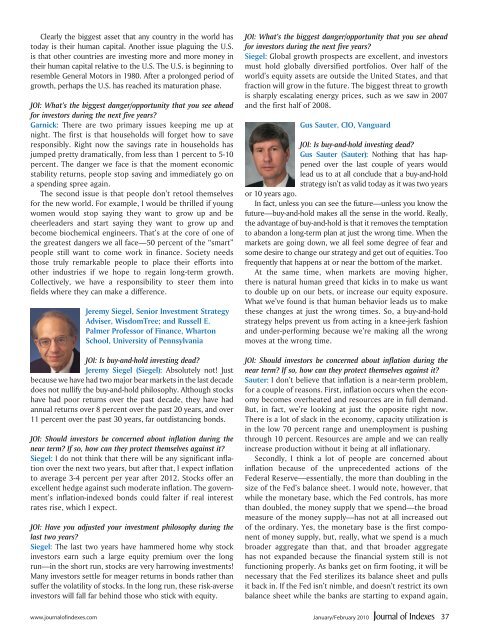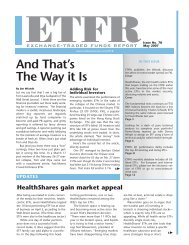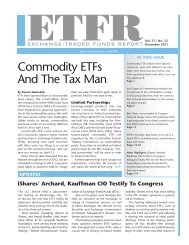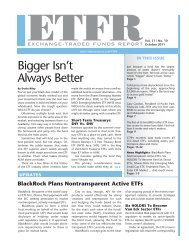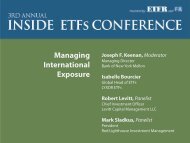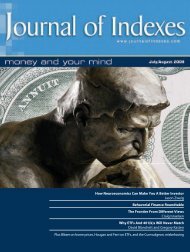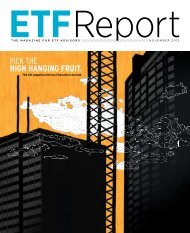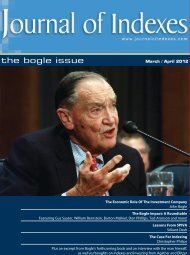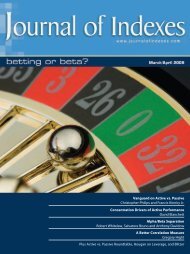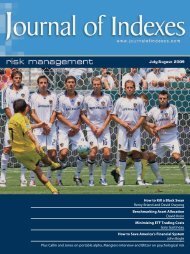Download - IndexUniverse.com
Download - IndexUniverse.com
Download - IndexUniverse.com
Create successful ePaper yourself
Turn your PDF publications into a flip-book with our unique Google optimized e-Paper software.
Clearly the biggest asset that any country in the world has<br />
today is their human capital. Another issue plaguing the U.S.<br />
is that other countries are investing more and more money in<br />
their human capital relative to the U.S. The U.S. is beginning to<br />
resemble General Motors in 1980. After a prolonged period of<br />
growth, perhaps the U.S. has reached its maturation phase.<br />
JOI: What’s the biggest danger/opportunity that you see ahead<br />
for investors during the next five years?<br />
Garnick: There are two primary issues keeping me up at<br />
night. The first is that households will forget how to save<br />
responsibly. Right now the savings rate in households has<br />
jumped pretty dramatically, from less than 1 percent to 5-10<br />
percent. The danger we face is that the moment economic<br />
stability returns, people stop saving and immediately go on<br />
a spending spree again.<br />
The second issue is that people don’t retool themselves<br />
for the new world. For example, I would be thrilled if young<br />
women would stop saying they want to grow up and be<br />
cheerleaders and start saying they want to grow up and<br />
be<strong>com</strong>e biochemical engineers. That’s at the core of one of<br />
the greatest dangers we all face—50 percent of the “smart”<br />
people still want to <strong>com</strong>e work in finance. Society needs<br />
those truly remarkable people to place their efforts into<br />
other industries if we hope to regain long-term growth.<br />
Collectively, we have a responsibility to steer them into<br />
fields where they can make a difference.<br />
Jeremy Siegel, Senior Investment Strategy<br />
Adviser, WisdomTree; and Russell E.<br />
Palmer Professor of Finance, Wharton<br />
School, University of Pennsylvania<br />
JOI: Is buy-and-hold investing dead?<br />
Jeremy Siegel (Siegel): Absolutely not! Just<br />
because we have had two major bear markets in the last decade<br />
does not nullify the buy-and-hold philosophy. Although stocks<br />
have had poor returns over the past decade, they have had<br />
annual returns over 8 percent over the past 20 years, and over<br />
11 percent over the past 30 years, far outdistancing bonds.<br />
JOI: Should investors be concerned about inflation during the<br />
near term? If so, how can they protect themselves against it?<br />
Siegel: I do not think that there will be any significant inflation<br />
over the next two years, but after that, I expect inflation<br />
to average 3-4 percent per year after 2012. Stocks offer an<br />
excellent hedge against such moderate inflation. The government’s<br />
inflation-indexed bonds could falter if real interest<br />
rates rise, which I expect.<br />
JOI: Have you adjusted your investment philosophy during the<br />
last two years?<br />
Siegel: The last two years have hammered home why stock<br />
investors earn such a large equity premium over the long<br />
run—in the short run, stocks are very harrowing investments!<br />
Many investors settle for meager returns in bonds rather than<br />
suffer the volatility of stocks. In the long run, these risk-averse<br />
investors will fall far behind those who stick with equity.<br />
JOI: What’s the biggest danger/opportunity that you see ahead<br />
for investors during the next five years?<br />
Siegel: Global growth prospects are excellent, and investors<br />
must hold globally diversified portfolios. Over half of the<br />
world’s equity assets are outside the United States, and that<br />
fraction will grow in the future. The biggest threat to growth<br />
is sharply escalating energy prices, such as we saw in 2007<br />
and the first half of 2008.<br />
Gus Sauter, CIO, Vanguard<br />
JOI: Is buy-and-hold investing dead?<br />
Gus Sauter (Sauter): Nothing that has happened<br />
over the last couple of years would<br />
lead us to at all conclude that a buy-and-hold<br />
strategy isn’t as valid today as it was two years<br />
or 10 years ago.<br />
In fact, unless you can see the future—unless you know the<br />
future—buy-and-hold makes all the sense in the world. Really,<br />
the advantage of buy-and-hold is that it removes the temptation<br />
to abandon a long-term plan at just the wrong time. When the<br />
markets are going down, we all feel some degree of fear and<br />
some desire to change our strategy and get out of equities. Too<br />
frequently that happens at or near the bottom of the market.<br />
At the same time, when markets are moving higher,<br />
there is natural human greed that kicks in to make us want<br />
to double up on our bets, or increase our equity exposure.<br />
What we’ve found is that human behavior leads us to make<br />
these changes at just the wrong times. So, a buy-and-hold<br />
strategy helps prevent us from acting in a knee-jerk fashion<br />
and under-performing because we’re making all the wrong<br />
moves at the wrong time.<br />
JOI: Should investors be concerned about inflation during the<br />
near term? If so, how can they protect themselves against it?<br />
Sauter: I don’t believe that inflation is a near-term problem,<br />
for a couple of reasons. First, inflation occurs when the economy<br />
be<strong>com</strong>es overheated and resources are in full demand.<br />
But, in fact, we’re looking at just the opposite right now.<br />
There is a lot of slack in the economy, capacity utilization is<br />
in the low 70 percent range and unemployment is pushing<br />
through 10 percent. Resources are ample and we can really<br />
increase production without it being at all inflationary.<br />
Secondly, I think a lot of people are concerned about<br />
inflation because of the unprecedented actions of the<br />
Federal Reserve—essentially, the more than doubling in the<br />
size of the Fed’s balance sheet. I would note, however, that<br />
while the monetary base, which the Fed controls, has more<br />
than doubled, the money supply that we spend—the broad<br />
measure of the money supply—has not at all increased out<br />
of the ordinary. Yes, the monetary base is the first <strong>com</strong>ponent<br />
of money supply, but, really, what we spend is a much<br />
broader aggregate than that, and that broader aggregate<br />
has not expanded because the financial system still is not<br />
functioning properly. As banks get on firm footing, it will be<br />
necessary that the Fed sterilizes its balance sheet and pulls<br />
it back in. If the Fed isn’t nimble, and doesn’t restrict its own<br />
balance sheet while the banks are starting to expand again,<br />
www.journalofindexes.<strong>com</strong> January/February 2010<br />
37


